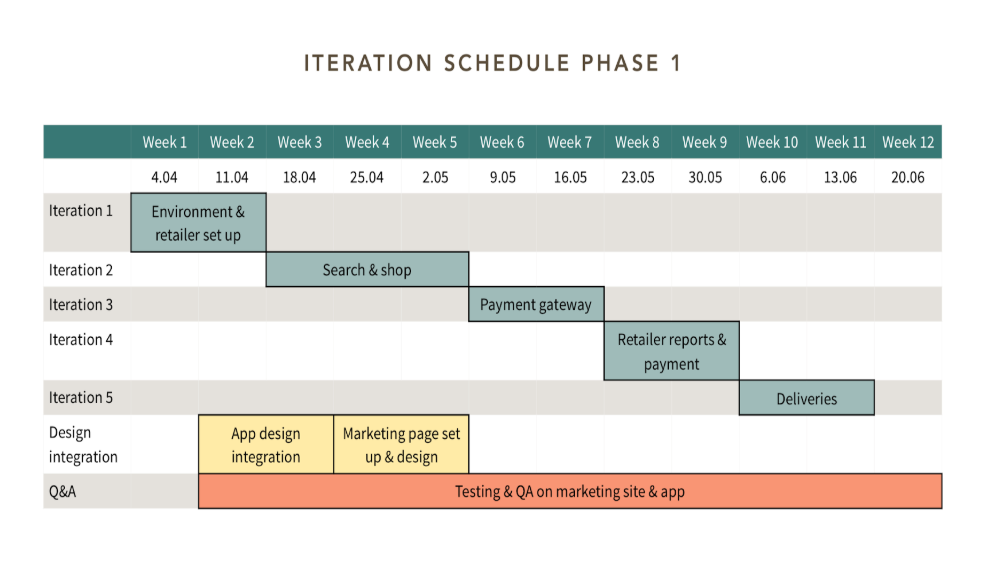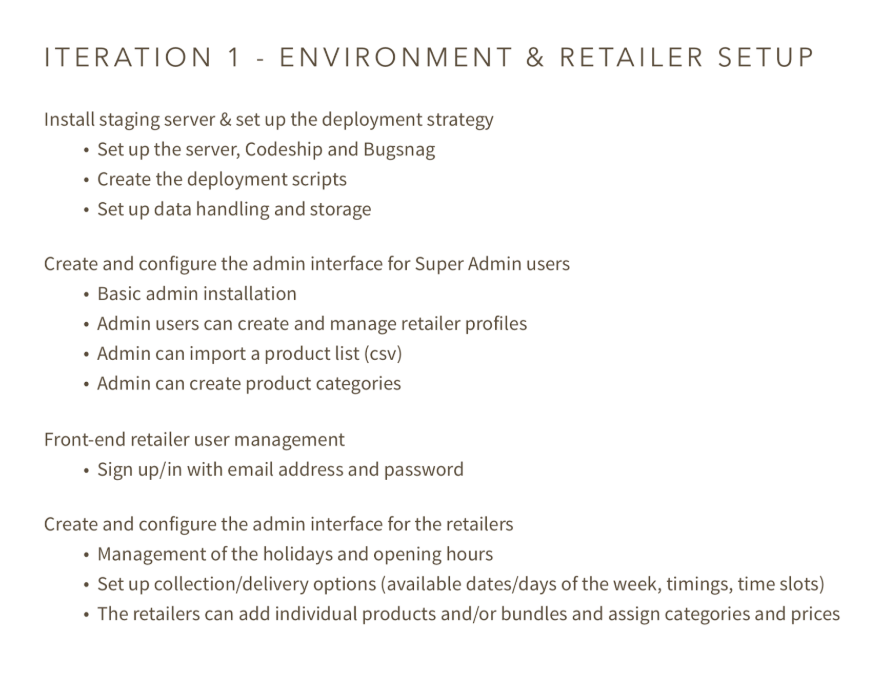You’re starting a new project and hiring a top technical agency to build your product. Everyone has high expectations… and tight deadlines. Here’s how to plan the process and manage your technical partnership to ensure things stay on track.
Now that you’ve planned your app, done your research and chosen to partner with a technical agency, it’s time to get stuff done!
The building phase of the project will probably be the most time-consuming and expensive. But it needn’t be nerve-wracking.
Follow these steps for effective project planning, good communication and a harmonious development phase.
Step 1: Set a realistic deadline
First, you need to have an honest chat with your technical partner to get a good understanding of their availability and capacity. What you want to know is what they can realistically achieve within your desired timeframe.
‘You can hire the best developers out there, but there’s always the risk of discovering a bug at the last minute.’
Your deadline will most likely be dictated by either your budget, or an event such as an industry fair or an important holiday.
Your technical partner should be able to give you a date for when you can expect your product to be released to production. Still, you might want to add at least a couple of weeks to that deadline to launch your big marketing campaign, just in case. You can hire the best developers out there, but there’s always the risk of discovering a bug at the last minute or needing to change a few details before the app goes live for everyone to see.
If deadlines are absolutely inflexible, your development team may feel like they have to cut corners, which can affect the overall quality of your product.
Check out our free report – Equity fundraising: A crash course
Step 2: Plan the work in detail
You then need to sit down together and work out a proper plan for the first few weeks of development. You’ll need to decide which features will be built as part of your minimum viable product (MVP), how they will be built, and how long each stage should take.
At CookiesHQ, we’ve been helping startups through this tricky stage for nearly eight years. Once we confirm with a client what should be included in the initial phase of work, we produce a delivery plan which is essentially a breakdown of the core functionalities for the app build.

The document also includes details about all the functionalities. The project manager can then use that document as a guide to ensure that the developers are working to schedule and everyone’s keeping an eye on the bigger picture.

We mostly work according to an Agile methodology, producing deliverables at the end of every two week iteration. ‘That’s not really Agile!’ I hear you say. And that’s true.
Working with startups for years has taught us that it’s actually very difficult to adopt a pure Agile methodology for MVPs. Founders, understandably, need assurances. They need to know when their product will be ready, and how much it will cost them. Like us, they are running a business and need to manage and plan their marketing, their sales… everything.
But this doesn’t mean that we can’t be flexible. This delivery plan should be a living document that can be amended. Priorities change, research continues.
Ideally, you should check in with your technical partner on a weekly or fortnightly basis throughout the development phase. You should ensure that the work is on track and that you’re happy with quality. The sooner you identify a problem and talk it through, the easier it is to adapt or fix it.
We are in constant open communication with our clients, and check in at least weekly, either in person or by video call, to make sure everyone is on the same page.
Step 3: Prepare to make compromises
This is where the word ‘partnership’ takes on its full meaning. When you work with an agency that provides a standalone service, you as a client will dictate the terms and they deliver the product.
The downside to this kind of arrangement is that they will only deliver what you’ve asked for – no more – take your money and move on to the next project. If there are flaws in your idea, they made not think it worthwhile to challenge you. If you need work done outside of the remit they may not be able, or willing, to accommodate you.
‘The right agency believes in your cause, gets stuck in and supports your journey to success.’
When you work with a partner, on the other hand, you discuss your business objectives with them and work towards your goals together. They’ll be on hand to help post-launch and be ready with honest opinions and advice, based on seeing your business as a whole rather than a list of features to code. They’ll be invested in you and your project and will likely be just as keen to see it succeed.
That said, you can only realise the potential of a partnership if you are both ready to make compromises.
Sometimes it means not being able to have that extra feature that you wanted, or having to push your deadline by a week. Your technical agency may need to compromise by adding a few more days of work while staying within your set budget, or dedicating two developers to your project instead of one for a short period.
The important thing to remember is that you are working together, not against each other.
Finding the right agency
The key to making an agency-startup relationship work is finding a partner, not a provider.
The right agency believes in your cause, gets stuck in and supports your journey to success. They see beyond the paycheck, making suggestions and pushing solutions that will benefit your product in the long run. They want to work with you, rather than for you.
There’s no exact method for finding the right agency, but start by meeting with a few and seeing which understands you and your product the best. You’ll be working with them for a while, so it’s important to find someone you get along with. Look out for good communication skills, ask for references, and – above all – trust your instinct.
Need help delivering a project on time and on budget?
Get in touch to find out what the CookiesHQ team could do for you.